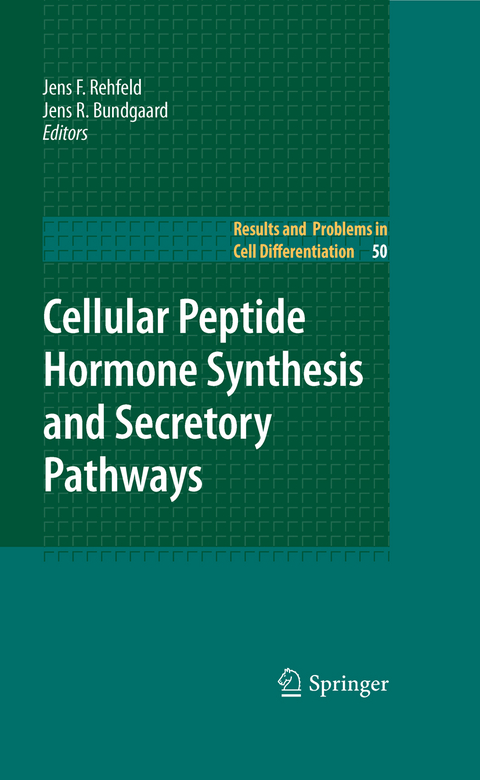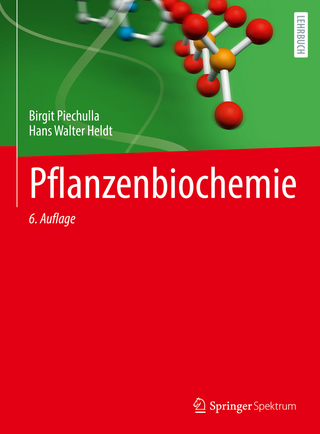
Cellular Peptide Hormone Synthesis and Secretory Pathways
Seiten
2012
|
2010
Springer Berlin (Verlag)
978-3-642-26276-0 (ISBN)
Springer Berlin (Verlag)
978-3-642-26276-0 (ISBN)
This book uses a broad variety of individual peptide systems to illustrate the modern biological concept of basic endocrinology. It also describes general issues such as maturation of secretory granules in the cells and cell-specific prohormone processing.
The concept of hormonal regulation using intercellular peptide messengers dates back to the discovery of secretin in 1902. The concept was simple: A peptide is released from specific hormone producing cells, endocrine cells, into circulation upon stimulation of the cells. The peptide hormone travels via blood to its target, the cells of which are equipped with specific receptors for high-affinity binding of the particular peptide hormone. Receptor binding subsequently elicits action of the target cells. This concept has been seriously challenged by modern biochemistry and cell biology. Thus, it is now well established that the gene of a specific peptide hormone may be expressed in different types of endocrine cells, in neurons, and in some instances also in adipocytes, myocytes, osteoblasts, and immune cells. Today, only a few hormones - including the old master hormone insulin - represent the original endocrine paradigm. Instead, the widespread cellular synthesis now raises the qu- tion of how the body maintains the regulation of its functions by peptide hormones when a hormone may originate from a variety of cells.
The concept of hormonal regulation using intercellular peptide messengers dates back to the discovery of secretin in 1902. The concept was simple: A peptide is released from specific hormone producing cells, endocrine cells, into circulation upon stimulation of the cells. The peptide hormone travels via blood to its target, the cells of which are equipped with specific receptors for high-affinity binding of the particular peptide hormone. Receptor binding subsequently elicits action of the target cells. This concept has been seriously challenged by modern biochemistry and cell biology. Thus, it is now well established that the gene of a specific peptide hormone may be expressed in different types of endocrine cells, in neurons, and in some instances also in adipocytes, myocytes, osteoblasts, and immune cells. Today, only a few hormones - including the old master hormone insulin - represent the original endocrine paradigm. Instead, the widespread cellular synthesis now raises the qu- tion of how the body maintains the regulation of its functions by peptide hormones when a hormone may originate from a variety of cells.
Maturation of Secretory Granules
Chromogranins A and B and Secretogranin II
Cell-specific Precursor Processing
ACTH: Cellular Peptide Hormone Synthesis and Secretory Pathways
Neurotensin and Neuromedicine N
Biosynthesis of Cardiac Natriuretic Peptides
Glucagon and Glucagon-like Peptides 1 and 2
Somatostatin and Somatostatin Receptors
Ghrelin: from Gene to Physiological Function
Post-translational Processing of Progastrin
VIP and PACAP
| Erscheint lt. Verlag | 4.5.2012 |
|---|---|
| Reihe/Serie | Results and Problems in Cell Differentiation |
| Zusatzinfo | VIII, 239 p. 36 illus. |
| Verlagsort | Berlin |
| Sprache | englisch |
| Maße | 155 x 235 mm |
| Gewicht | 380 g |
| Themenwelt | Naturwissenschaften ► Biologie ► Biochemie |
| Naturwissenschaften ► Biologie ► Mikrobiologie / Immunologie | |
| Naturwissenschaften ► Biologie ► Zellbiologie | |
| Schlagworte | biosynthesis • cell lines • endocrine biology • endocrinology • genes • granins • PAC • prohormone processing • secretory granules • Translation |
| ISBN-10 | 3-642-26276-7 / 3642262767 |
| ISBN-13 | 978-3-642-26276-0 / 9783642262760 |
| Zustand | Neuware |
| Haben Sie eine Frage zum Produkt? |
Mehr entdecken
aus dem Bereich
aus dem Bereich


